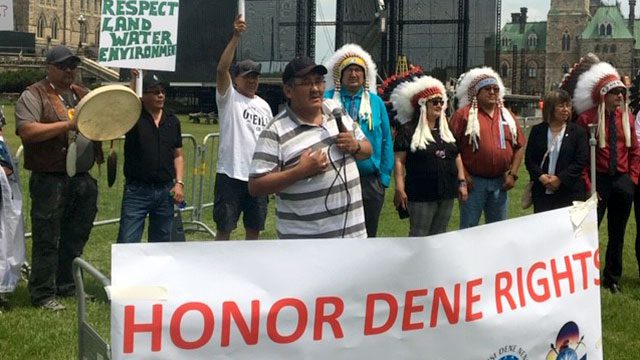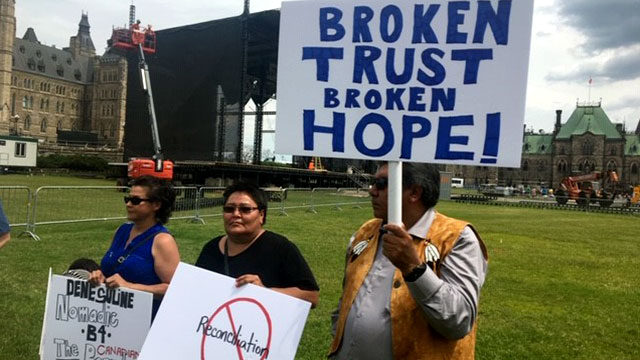

Two Manitoba Dene First Nations are turning to the courts after Crown Indigenous Relations Minister Carolyn Bennett has refused to explain why she cancelled a meeting where a draft land claim agreement was expected to be signed.
The Sayisi Dene and Northlands Denesuline First Nations have applied for a judicial review by a federal court of Bennett’s decision to shut down negotiations.
The land in question is Dene traditional territory in the Northwest Territories and Nunavut.
“What was hope only a few short months ago has been replaced with cynicism,” they said in a joint statement today. “Minister Bennett appears to be insensitive to the profound hurt and disappointment she has caused.”
“Our people deserve to be treated with respect,” said Sayisi Dene Chief Tony Powderhorn. “I am hopeful that Minister Bennett will resume negotiations and allow the land claim agreement to move to community ratification.”
Nearly a month ago, a group of Dene leaders and supporters traveled to Ottawa looking for answers during a press conference and demonstration on Parliament Hill.
“Prime Minister Trudeau and Minister Bennett you have betrayed us, you are not honourable, you are not true to your words,” said Athabasca Denesuline chief negotiator Ron Robillard during the press conference on June 19.
Read more:
Dene First Nations say they have been betrayed by the federal government
In 2000, the Dene set aside a court case that started in 1991 and began negotiating a comprehensive claim over lands and resources.
However, the area the Dene are negotiating is in the southeast part of the NWT.
Both the NWT Metis and Akaitcho Dene have competing claims in that area.
In 2017, Thomas Isaac, Bennett’s special representative, prepared a report on all the competing Indigenous claims in the southeastern NWT.
Isaac wrote that the status quo isn’t working.
“Collectively, the claims and issues of the Aboriginal groups noted above represent a dynamic and challenging legal, political and negotiating environment not easily resolved,” wrote Isaac.
“The current negotiations and related processes applicable in the Southeast NWT appear stagnant and are not resulting in sustainable, lasting solutions that all of the relevant parties, Aboriginal peoples, the government of the NWT, and Canada, can live with.”
In an emailed statement to APTN News Thursday, Bennett’s office appeared to back that opinion.
“Concerns have been raised by Indigenous groups in the Northwest Territories about the terms of the draft agreement and the impact on their communities and rights,” it said.
“We have a responsibility to meaningfully consult with these communities in order to understand and work through the issues they have brought forward.”
In 2016 other Indigenous groups in the NWT were able to look at the Dene’s draft agreement and expressed concerns.
Robillard believed they had been addressed.
“We even changed some of the draft wording in our agreement and we thought everything was settled until this last minute that came up,” he said.
The Dene had reached a memorandum of understanding with the Inuit, where their claim overlapped into Nunavut. The agreement would allow the Dene’s one to proceed with the promise of talks at a later date to resolve outstanding issues.
“So that was something that was very successful,” said Robillard. “And we tried to do that with the Indigenous groups in the NWT with no success.”










